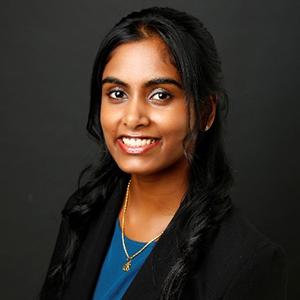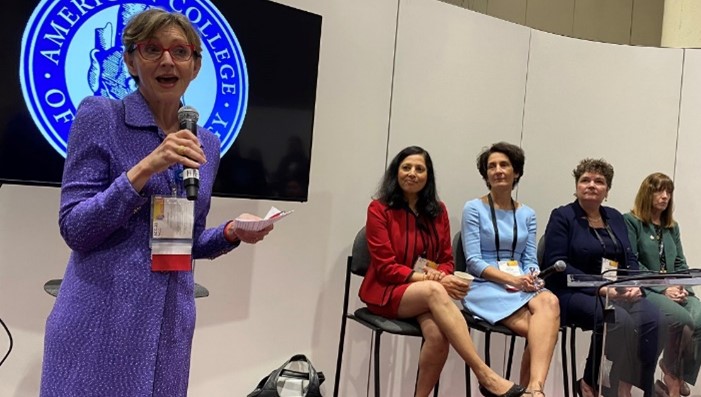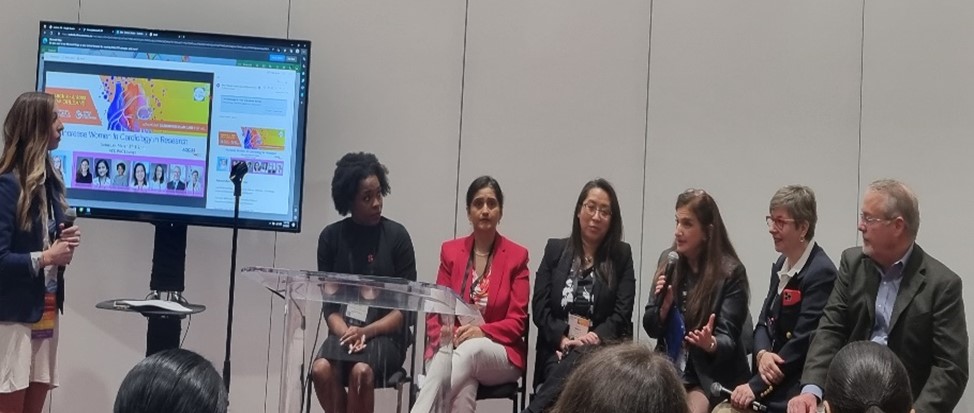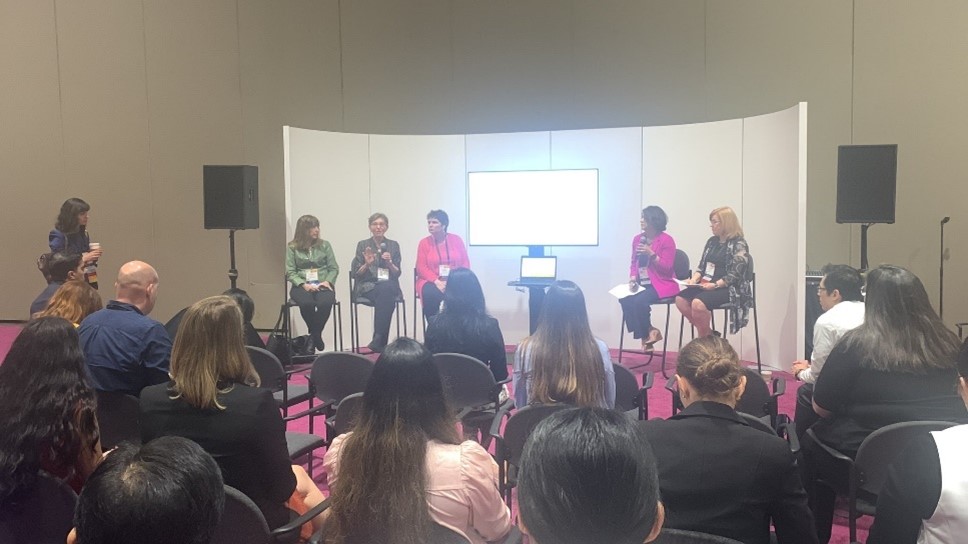Inspiring WIC Lounge Sessions at ACC.23/WCC

The Women in Cardiology (WIC) Section organized several sessions at ACC.23/WCC in New Orleans, LA. A breadth of topics were discussed, including women in leadership, women in research, balancing parenting with a career in cardiology, and flexible schedules in cardiology. As an internal medicine resident participating in ACC's Internal Medicine Cardiology Program, I was sponsored by the program to attend my first ACC Annual Scientific Session. At the conference, I attended several thought-provoking and inspiring sessions in the WIC lounge.
ACC Women Leaders Panel
The WIC lounge sessions kicked off with a panel of ACC Women Leaders. Sharonne Hayes, MD, FACC, moderated the discussion and the all-star panelists included three past ACC presidents, Mary Walsh, MD, MACC; Athena Poppas, MD, MACC; and Dipti Itchhaporia, MD, MACC, as well as current and previous WIC chairs, Gina Lundberg, MD, FACC, and Claire Duvernoy, MD, FACC.
The panelists shared their paths into cardiology, everything from their successes and triumphs to their struggles with imposter syndrome and the challenges of being a woman in cardiology. They shared that establishing allyship with male colleagues, being a role mode, leading by example, and utilizing the support network built through ACC and the WIC Section helped them overcome some of these challenges. They emphasized the importance of asking for the roles and responsibilities we want in our careers rather than waiting for them to be handed to us. The panelists also noted that once these opportunities are offered, we should carry out these roles with diligence, remain confident in our abilities, and deliver on promises with utmost sincerity.

Seeing these extraordinarily successful women leaders in the field of cardiology, who are also great clinicians, mothers, wives, and daughters, in addition to their many other responsibilities, was incredibly inspiring. I was moved by their stories of struggle and eventual triumphs, inspired by their resilience and perseverance and motivated by their confidence and self-belief. I felt emotionally connected with their exceptional journeys into cardiology and imagined myself in their shoes, feeling empowered to overcome the challenges I see myself encountering on my path to cardiology. This session was a tangible symbol to aspiring cardiologists like me to confirm that cardiology can be a speciality in which women can thrive, flourish and succeed.
Increasing Women in Cardiology Research

The next session was a panel discussion on increasing women in cardiovascular research, moderated by Kristen Brown, MD.
Roxana Mehran, MD, FACC, spoke of her journey of becoming a clinical trialist and the rewards of a career in research. She called for more women to get involved in cardiovascular research. She highlighted the unique attributes women bring to the table, including bringing attention to issues affecting women, improving diversity and inclusivity in clinical trials, reducing sex and gender-related inequalities, leading to better science and outcomes for our patients, and changing the landscape of cardiovascular research.
Next, Puja Mehta, MD, FACC, discussed issues affecting Early Career professionals and Fellows in Training. We were reminded about the importance of getting protected time to engage in research diligently, staying resilient and persistent through failures and rejections. Dr. Mehta also emphasized the importance of finding good mentors who advocate and speak for us when we are not in the room.
LaPricess Brewer, MD, MPH, FACC, spoke about her work in community-based research working with underrepresented minorities. She showcased that research does not need to fit inside predefined boxes, and we can carve research based on our interests and passions. We learned the value of choosing opportunities carefully, saying yes judiciously and saying no to things that do not align with our interests.
Tracy Wang, MD, FACC, shared her experience as a female researcher, scientist and clinical trialist. She spoke candidly about her initial struggles with public speaking and her strategies for overcoming, such as watching recordings of herself speaking publicly, imitating others who inspired her, and developing her confidence small steps at a time. For researchers early in their careers, she emphasised the importance of acquiring a unique skill set, specializing in something, and finding a niche that we can use to sell ourselves.
Daniel Anderson, MD, PhD, FACC, spoke encouragingly of men serving as allies for women in research. He highlighted that it is everyone's responsibility – men and women alike – to create a workforce which reflects the population it serves. He expressed that women serve as role models for positive change and create a better future for their daughters.
Overall, the session illustrated that women in cardiology can be successful researchers, scientists and clinical trialists. I was inspired to get involved in research and left with actionable steps I can take to get involved in cardiovascular research.
Thriving as a Parent in Cardiology

An afternoon session was an interactive panel discussion on balancing and integrating parenting with a career in cardiology. Kamala Tamirisa, MD, FACC; Estefania Oliveros, MD, FACC; and Sarah Rosanel, MD, FACC, chaired the discussion. There was a broad mix of men and women cardiologists at different stages of their career on the panel. Some of the panellists openly spoke about their struggles with work environments not being prepared to support them during childbearing, the steps they took, and changes they helped implement to make parenting in cardiology more feasible.
One aspect which was emphasized was the importance of anticipating and preparing for parenthood, such as open conversations with one's spouse, colleagues, fellowship director, and other leadership members. They noted that these discussions should include the distribution of roles, order of rotations, call schedules, time off, and any potential impact on length of training. The need for transparency, flexibility, and creativity was emphasized, including considering out-of-the-box solutions such as working evenings or weekends or utilizing telehealth options.
Another point that resonated was the importance of building a support network and not being afraid to ask for help. The panellists spoke about the ways they delegate tasks and split domestic responsibilities within their support systems including using nannies and au pairs to help with childcare, outsourcing domestic duties, and fairly distributing workload through honest conversations with their partners.
It was encouraging to hear the unified message that, while challenging, it is possible to thrive as a parent in cardiology. Hearing their real-life examples allowed me to overcome some of the misconceptions I had about cardiology not being a family-friendly speciality. The positive changes they helped implement motivated me to be a force of change myself and overcome stereotypes about cardiologists.
Flexible Schedules in Cardiology

The panelists for the final WIC lounge session were three of the co-authors of the new ACC health policy statement, Health Policy Statement on Career Flexibility in Cardiology2, Sharonne Hayes, MD, FACC; Claire Duvernoy, MD, FACC; and Mary Walsh, MD, MACC. The discussion was moderated by Gina Lundberg, MD, FACC, and Toniya Singh, MD, FACC.
They discussed the necessity for career flexibility and the utility of this policy paper for not only women in cardiology but also Fellows in Training, Early Career professionals and advanced-career cardiologists. We learned that the policy paper can help both men and women advocate for autonomy over schedules, with guidance on achieving this with transparency and fairness, without unreasonable repercussions. Some suggested strategies to achieving flexibility included the utilization of telehealth, shift and team-based care models, and competency-based training.
Lack of control, unpredictable hours, and career rigidity are common obstacles for choosing to not pursue a career in cardiology. This session highlighted yet another means cardiology is changing by integrating work-life balance, autonomy over schedules and work hours, further dropping barriers into cardiology.
Conclusion
After attending these ACC.23/WCC WIC lounge sessions, I am confident that I will not be alone as a future woman in cardiology. I will have both men and women colleagues, peers and mentors on whom I can rely. I can achieve a work-life balance and do justice to other roles in my life. I can succeed in academia, research and leadership. I saw women, who looked just like me, achieve incredible things that I once thought were not possible for women in cardiology. I found a village of support to help me achieve my dream of becoming a cardiologist. I feel empowered, encouraged and ever more confident about my choice to pursue a career in cardiology. For all the men and women who are changing the landscape within cardiology, thank you for making the field a more welcoming place for people like me.

This article was authored by Prasanti Alekhya Kotta, MB BChir, MA (Cantab), an internal medicine resident at the Baylor College of Medicine, Houston. She is a member of the ACC Internal Medicine Cardiology Program.
This content was developed independently from the content developed for ACC.org. This content was not reviewed by the American College of Cardiology (ACC) for medical accuracy and the content is provided on an "as is" basis. Inclusion on ACC.org does not constitute a guarantee or endorsement by the ACC and ACC makes no warranty that the content is accurate, complete or error-free. The content is not a substitute for personalized medical advice and is not intended to be used as the sole basis for making individualized medical or health-related decisions. Statements or opinions expressed in this content reflect the views of the authors and do not reflect the official policy of ACC.